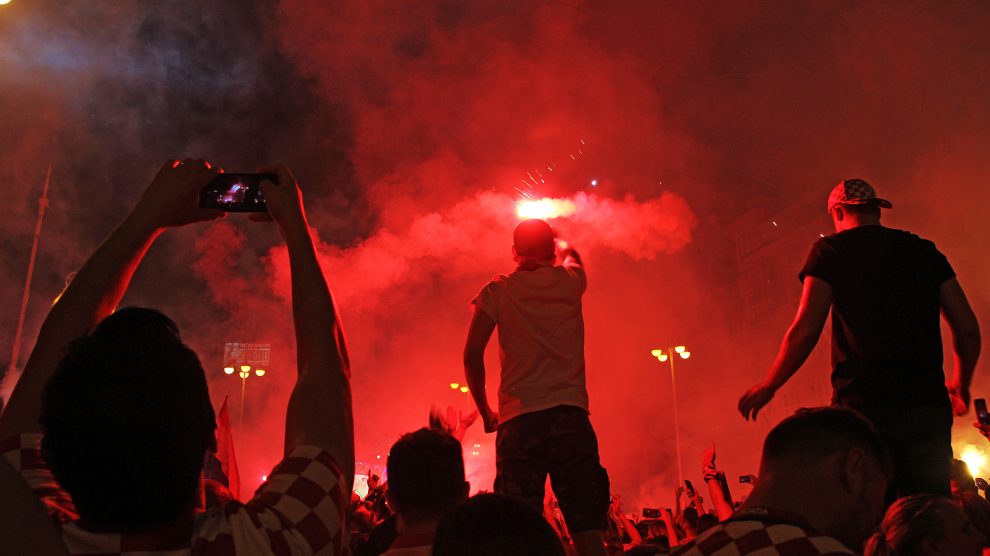European football’s governing body needs to enforce stricter discipline to restore order on and off the pitch.
UEFA has been a frequent fixture in the headlines during this year’s Euros tournament—not always because of the football matches, but often thanks to the large number of investigations for incidents which should have no place in sports.
The frequency of violence and other misbehaviour at the tournament makes it clear existing measures imposed by UEFA to tackle these issues have failed. UEFA must now go back to the drawing board.
- Small-town heroes: Chronicling the fast-disappearing world of Polish football
- Football, protests, and the emergence of New Georgia
- Bridging economies: The catalyst role of low-cost cross-border payments in the Western Balkans
Given the alarming volume of incidents, the usual playbook of fines and temporary restrictions is not enough. For such persistent politically-fuelled behaviour among football fans, UEFA should consider sporting penalties like points deductions during the group stages, or immediate disqualification for the most serious cases.
Such sanctions might seem draconian at first, but in this time of fractious politics, harsher measures are necessary to maintain a civilised atmosphere for law-abiding fans and preserve the sanctity of safe sport. UEFA has a responsibility to make it clear there is no space for politics and hatred in sport.
There are other options available in UEFA’s toolbox, too. It could also prioritise the threat of hosting matches behind closed doors, a traumatic callback to the days of Covid-19 which would hit misbehaving supporters where it hurts most—their ability to watch their team live.
Football is by far the most popular sport in Europe. Every four years, the Euros command the continent’s attention. National pride is normal and healthy, but too often, it spills over into something harmful.
The Euros has a long history of violent incidents driven by nationalism. In the 2024 tournament, these events continue to distract from the football, despite UEFA’s financial fines and sanctions. Dishing out more than 1.2 million euros in fines might sound like a lot, but fining 21 out of 24 countries for fan behaviour without seeing a drop in incidents casts doubt on the impact of these punishments.
Balkan countries are overrepresented in unpleasant incidents, even though most do not participate in the championship. Most of the fines were received by three of the participating Balkan countries: Croatia, Serbia and Albania.
The deep-rooted historical and political tensions in the region’s countries once again led to several incidents, including throwing objects, lighting flares, and displaying offensive messages. The tensions reached the point where Serbia even threatened to withdraw from the tournament if Albania and Croatia were not punished because of the behaviour of their fans.
To make things worse, fan incidents are not the only problem. Even players are getting in on the act. Albanian player Mirlind Daku for instance, after a match against Croatia, blasted insulting messages through a megaphone aimed at neighbouring Serbia and North Macedonia—the latter not even participating in the tournament.
Meanwhile, Turkish player Merih Demiral celebrated his second goal against Austria by making the ‘wolf’ gesture, associated with an extremist and supremacist movement in Turkey. Both Daku and Demiral earned a suspension of two matches, with Daku also receiving sanctions from his home club.
Demiral’s case also raised a diplomatic dispute, which only shows the potential these events have to spiral out of control, surpassing football. It seems that high emotions at matches are stronger than rational thinking, so perhaps in addition to stricter penalties, UEFA should invest in educational programs and a greater focus in player selection on temperament and behaviour.
Incidents of this type are not only detrimental to the safety and enjoyment of the sport as a non-political event, but they also destroy the possibility of unity through sport. Existing measures, predominantly financial penalties, seem inadequate and insufficient to deter inappropriate and criminal behaviour.
National football associations often absorb fines with minimal lasting impact to their budget. Fans largely escape accountability. This makes stricter sanctions necessary, including sporting penalties like point deductions.
Violence and political hatred by a large number of fans and even footballers leaves a black mark on the entire event. The politicisation of non-political events is nothing new. The way UEFA and national football associations deal with it will directly affect whether the football of the future will be a forum for the spread of hatred and violence, or national pride with mutual respect and a sporting atmosphere of fair play.
Unlike many news and information platforms, Emerging Europe is free to read, and always will be. There is no paywall here. We are independent, not affiliated with nor representing any political party or business organisation. We want the very best for emerging Europe, nothing more, nothing less. Your support will help us continue to spread the word about this amazing region.
You can contribute here. Thank you.


